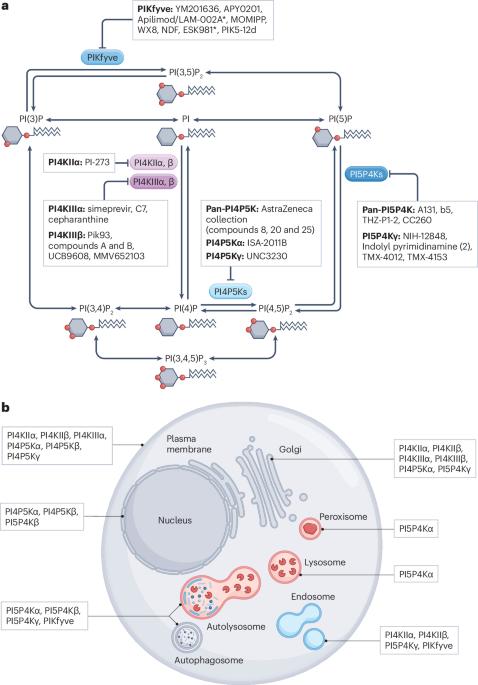癌症中的磷酸肌酸激酶:从分子机制到治疗机会
IF 66.8
1区 医学
Q1 ONCOLOGY
引用次数: 0
摘要
磷脂肌苷激酶,超越了众所周知的磷脂肌苷3激酶(PI3K),是脂质磷脂肌苷动态和位点特异性磷酸化的关键参与者。与pi3k不同,磷脂酰肌醇4-激酶(PI4Ks)和磷脂酰肌醇磷酸激酶(PIPKs)通常不会表现出突变改变,但在肿瘤中大多表现出表达改变,协调广泛的信号传导、代谢和免疫过程,所有这些过程在癌症的发病机制中都是至关重要的。PI4Ks和PIPKs的失调与各种恶性肿瘤有关,这引起了人们对其治疗靶点的极大兴趣。在这篇综述中,我们总结了目前研究较少的磷酸肌苷激酶家族,PI4K和PIPK,重点是它们在癌症中的功能和相关性。此外,我们还概述了正在进行的推动磷酸肌苷激酶靶向分子临床前和临床开发的努力。本文章由计算机程序翻译,如有差异,请以英文原文为准。


Phosphoinositide kinases in cancer: from molecular mechanisms to therapeutic opportunities
Phosphoinositide kinases, extending beyond the well-known phosphoinositide 3-kinase (PI3K), are key players in the dynamic and site-specific phosphorylation of lipid phosphoinositides. Unlike PI3Ks, phosphatidylinositol 4-kinases (PI4Ks) and phosphatidylinositol phosphate kinases (PIPKs) do not usually exhibit mutational alterations, but mostly show altered expression in tumours, orchestrating a broad spectrum of signalling, metabolic and immune processes, all of which are crucial in the pathogenesis of cancer. Dysregulation of PI4Ks and PIPKs has been associated with various malignancies, which has sparked considerable interest towards their therapeutic targeting. In this Review we summarize the current understanding of the lesser-studied phosphoinositide kinase families, PI4K and PIPK, focusing on their functions and relevance in cancer. In addition, we provide an overview of ongoing efforts driving the preclinical and clinical development of phosphoinositide kinase-targeting molecules. In this Review, Emerling and colleagues summarize the roles of phosphatidylinositol 4-kinases (PI4Ks) and phosphatidylinositol phosphate kinases (PIPKs) in cancer. They highlight the altered expression of these kinases in tumours and discuss ongoing efforts in developing therapies targeting these lesser-studied phosphoinositide kinase families.
求助全文
通过发布文献求助,成功后即可免费获取论文全文。
去求助
来源期刊

Nature Reviews Cancer
医学-肿瘤学
CiteScore
111.90
自引率
0.40%
发文量
97
审稿时长
6-12 weeks
期刊介绍:
Nature Reviews Cancer, a part of the Nature Reviews portfolio of journals, aims to be the premier source of reviews and commentaries for the scientific communities it serves. The correct abbreviation for abstracting and indexing purposes is Nat. Rev. Cancer. The international standard serial numbers (ISSN) for Nature Reviews Cancer are 1474-175X (print) and 1474-1768 (online). Unlike other journals, Nature Reviews Cancer does not have an external editorial board. Instead, all editorial decisions are made by a team of full-time professional editors who are PhD-level scientists. The journal publishes Research Highlights, Comments, Reviews, and Perspectives relevant to cancer researchers, ensuring that the articles reach the widest possible audience due to their broad scope.
 求助内容:
求助内容: 应助结果提醒方式:
应助结果提醒方式:


